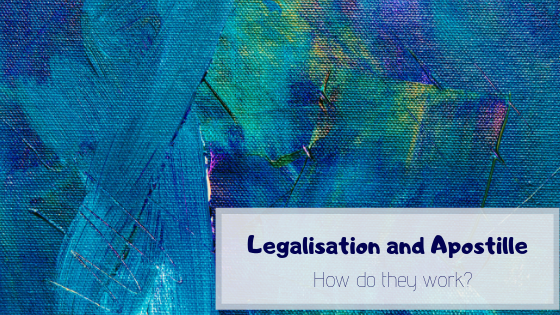- Home
- English to Italian Translation Services
-
FREE RESOURCES
-
Citizenship by Descent: Free Guide
>
- 5 Benefits of Italian Dual Citizenship
- 14 Documents Needed for Italian Dual Citizenship [Free Checklist]
- Citizenship by Descent: Get it in ITALY
- Gaining Italian Citizenship via Female Ancestors
- Italian Dual Citizenship: Get it Through the Courts
- Reacquisition of Italian Citizenship
- Price of Italian Citizenship: How Much Will it Cost?
- How long does it take to get Italian citizenship?
- Citizenship by Marriage >
- Canadian-Italian Dual Citizenship
-
Citizenship by Descent: Free Guide
>
- Blog
- Contact
|
Legalisation and Apostille are two terms referring to the procedure giving legal validity to a translation (or a document) to be submitted abroad. But how do they work? Can you do them yourself? For an official document to be valid abroad, you need to have it legalized or apostilled.
Both terms refer to the procedure confirming the document's authenticity and making the document valid internationally. The Apostille stamp is applied on documents to be submitted to signatories of The Hague Convention of 1961, while the legalisation stamp is used for all other countries. Who needs apostilles or legalisations? Well, you may need it on your birth certificates for marriage, on your school-leaving certificate to enroll in a university abroad, to notify a court ruling abroad, to incorporate a branch of your company abroad, to apply for Italian dual citizenship... Who issues apostilles or legalisations? In Italy it's the Procura (for translations) or Prefettura (for vital records certificates to be translated). What are the fees? It's free of charge. Does it take long to get an Apostille? It depends on the Procura. In the case of Rovigo, where I'm based, it's usually ready in 24 hours. Need help? Let's talk! Comments are closed.
|
AuthorI'm Natalia Bertelli, an English/Spanish to Italian legal translator. Since 2008 I have been working on contracts, judicial deeds, certificates, corporate translations for foreign clients who want to do business in Italy, get a dual citizenship or simply settle in my beautiful country. Categories
All
|
NATALIA BERTELLI, ENGLISH TO ITALIAN SWORN TRANSLATOR
ENGLISH TO ITALIAN LEGAL TRANSLATIONS | SWORN TRANSLATOR | TRANSLATOR COACH | ATA MEMBER
LISTED ON THE UK.GOV AND IN THE US EMBASSY LIST OF TRANSLATORS
Intl. calls: +39 338 263 7469 (Claudia, Project Manager)
[email protected]
VAT No. 01404870295
Privacy Policy
ENGLISH TO ITALIAN LEGAL TRANSLATIONS | SWORN TRANSLATOR | TRANSLATOR COACH | ATA MEMBER
LISTED ON THE UK.GOV AND IN THE US EMBASSY LIST OF TRANSLATORS
Intl. calls: +39 338 263 7469 (Claudia, Project Manager)
[email protected]
VAT No. 01404870295
Privacy Policy
- Home
- English to Italian Translation Services
-
FREE RESOURCES
-
Citizenship by Descent: Free Guide
>
- 5 Benefits of Italian Dual Citizenship
- 14 Documents Needed for Italian Dual Citizenship [Free Checklist]
- Citizenship by Descent: Get it in ITALY
- Gaining Italian Citizenship via Female Ancestors
- Italian Dual Citizenship: Get it Through the Courts
- Reacquisition of Italian Citizenship
- Price of Italian Citizenship: How Much Will it Cost?
- How long does it take to get Italian citizenship?
- Citizenship by Marriage >
- Canadian-Italian Dual Citizenship
-
Citizenship by Descent: Free Guide
>
- Blog
- Contact

 RSS Feed
RSS Feed